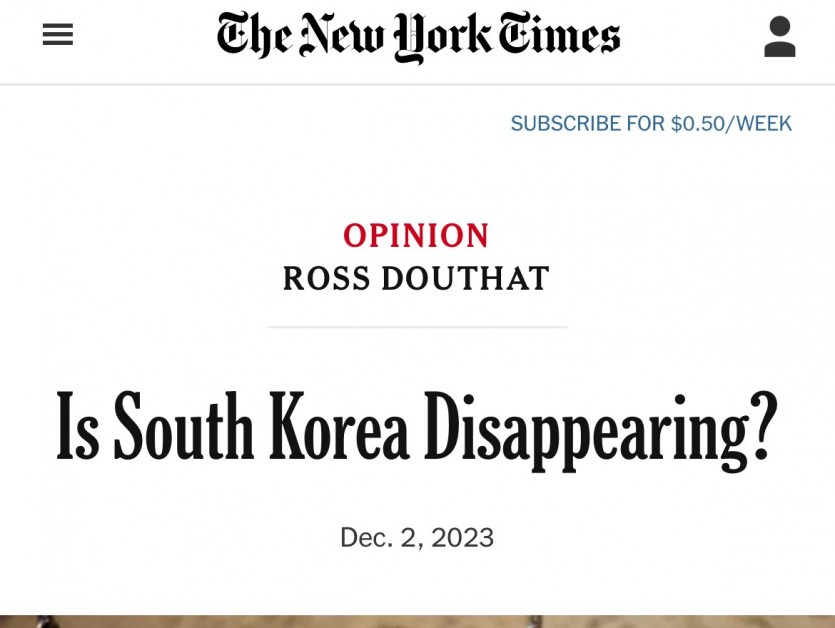한국 인구감소
페이지 정보
본문

“
이제 얼마 동안, 한국은 선진국에 걸쳐 있는 인구 감소 문제에서 눈에 띄는 사례 연구였다. 거의 모든 부유한 나라들은 그들의 출산율이 대체 수준 이하로 정착하는 것을 목격했지만, 그것은 보통 여성 당 1.5명의 아이들이 있는 지역 어딘가에 있다는 것을 의미한다. 예를 들어, 2021년 미국은 1.7명, 프랑스는 1.8명, 이탈리아는 1.3명, 캐나다는 1.4명이었다.
그러나 한국은 1980년대에 교체 이하의 영역으로 빠져들었지만 최근에는 더 많이 하락하고 있다는 점에서 특징적이다. 2018년에는 여성 1명당 1명 이하로 떨어졌고, 팬데믹 이후에는 0.8명으로, 현재는 2023년 2분기와 3분기의 잠정 데이터에서 여성 1명당 0.7명의 출산으로 떨어졌다.
그것이 무엇을 의미하는지 풀어볼 가치가 있다. 그 수준의 출산율을 유지한 국가는 한 세대에서 200명당 다음 세대에서는 70명의 인구가 14세기에 흑사병이 유럽에 전한 것보다 더 많을 것이다. 2세대 이직을 통해 실험을 실행하면 원래 200명이었던 인구가 25명 아래로 떨어진다. 다시 실행하면 스티븐 킹의 "더 스탠드"에 나오는 가상의 슈퍼플루로 인한 인구 감소에 가까워진다.
…
- 우리에게도, 지칠 줄 모르는 능력주의가 있다.
- 우리에게도, Z세대 남성과 여성 사이에 이념적 분열이 점점 더 심해지고 있다.
- 우리도, 반(反)자유주의적이지만 반드시 경건할 필요는 없는, 정신적이지만 종교적이지는 않은 권리인, 문화적 보수주의가 세속화되고 또 만들어가고 있다.
- 우리도 가상적 존재가 가져다 주는 유혹들과 병리들을 극복하려고 안간힘을 쓰고 있다.
따라서 현재 한국의 추세는 단순히 암울한 놀라움 그 이상이다. 그것은 우리에게 무엇이 가능한지에 대한 경고이다.
For some time now, South Korea has been a striking case study in the depopulation problem that hangs over the developed world. Almost all rich countries have seen their birthrates settle below replacement level, but usually that means somewhere in the neighborhood of 1.5 children per woman. For instance in 2021 the United States stood at 1.7, France at 1.8, Italy at 1.3 and Canada at 1.4.
But South Korea is distinctive in that it slipped into below-replacement territory in the 1980s but lately has been falling even more — dropping below one child per woman in 2018, to 0.8 after the pandemic, and now, in provisional data for both the second and third quarters of 2023, to just 0.7 births per woman.
It’s worth unpacking what that means. A country that sustained a birthrate at that level would have, for every 200 people in one generation, 70 people in the next one, a depopulation exceeding what the Black Death delivered to Europe in the 14th century. Run the experiment through a second generational turnover, and your original 200-person population falls below 25. Run it again, and you’re nearing the kind of population crash caused by the fictional superflu in Stephen King’s “The Stand.”
…
We too have an exhausting meritocracy. We too have a growing ideological division between men and women in Generation Z. We too are secularizing and forging a cultural conservatism that’s anti-liberal but not necessarily pious, a spiritual-but-not-religious right. We too are struggling to master the temptations and pathologies of virtual existence.
So the current trend in South Korea is more than just a grim surprise. It’s a warning about what’s possible for us.
“
(파파고 번역)
관련자료
-
이광진 12.31
안귀령님의 말솜씨가 예뿐 언굴과 같아 보기와 듣기가 좋았습니다. 엣말에 …
-
돌아이냐 12.30
머저리야! 죄명이는 2003년 7월 무고 공무원자격(검사)사칭과 관련 벌…
-
작가 이름 수… 12.16
권은지 x 권윤지 ㅇ
-
인마핱 12.16
비밀댓글입니다.
-
민주 11.29
실제 카카오톡 화면이 말하는사람이랑 듣는사람이랑 다 같은쪽에서 나와요? …
-
Www 11.17
아조씨 그건 아저씨가 남자니까 결혼이 좋은 거지
-
멋져부러 11.09
멋져부러 !!!!!!
-
Ww 11.04
임산부 앞에 두고 이기적인 놈
-
매너가 남자를… 10.25
와 너무 멋진 매너 할아버지
-
이원아웃 10.20
제발 이원욱 좀 아웃시켜라!!!! #진석범 검색해보니 괜찮은 사람이더라.…
- 이광진 12.31 안귀령님의 말솜씨가 예뿐 언굴과 같아 보기와 듣기가 좋았습니다. 엣말에 …
- 돌아이냐 12.30 머저리야! 죄명이는 2003년 7월 무고 공무원자격(검사)사칭과 관련 벌…
- 작가 이름 수… 12.16 권은지 x 권윤지 ㅇ
- 인마핱 12.16 비밀댓글입니다.
- 민주 11.29 실제 카카오톡 화면이 말하는사람이랑 듣는사람이랑 다 같은쪽에서 나와요? …
- Www 11.17 아조씨 그건 아저씨가 남자니까 결혼이 좋은 거지
- 멋져부러 11.09 멋져부러 !!!!!!
- Ww 11.04 임산부 앞에 두고 이기적인 놈
- 매너가 남자를… 10.25 와 너무 멋진 매너 할아버지
- 이원아웃 10.20 제발 이원욱 좀 아웃시켜라!!!! #진석범 검색해보니 괜찮은 사람이더라.…
